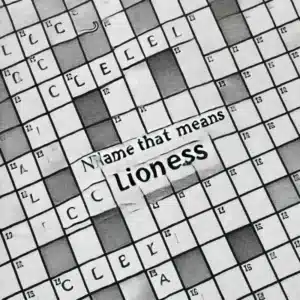Introduction
Crossword puzzles are a mental exercise enjoyed by millions, and The New York Times (NYT) Crossword is among the most renowned. Some clues in this puzzle series are particularly intriguing, one such clue being the “name that means lioness.” This article delves into the origins, usage, and significance of this clue, providing insights into how it’s used in the NYT Crossword. By the end, we’ll also explore the broader implications of this clue in the world of crossword puzzles.
Understanding the “Name That Means Lioness Nyt” Clue
In the context of the NYT Crossword, the clue “name that means lioness” typically points to names with meanings derived from various languages and cultures that translate to “lioness.” Common answers include names like “Leona,” “Ariella,” or “Nala,” each of which carries the symbolic strength and grace associated with a lioness. This clue is not only a test of linguistic knowledge but also of cultural awareness, as it draws from diverse backgrounds to challenge solvers.

The appeal of this clue lies in its cross-cultural references and the mental connections it encourages. Solvers need to think about the symbolic meanings of names, their origins, and the specific context provided by the puzzle to arrive at the correct answer.
The Frequency and Use of “Name That Means Lioness” in the NYT Crossword
To understand the significance of the “name that means lioness” clue, it’s useful to look at its frequency and the types of puzzles in which it appears. According to data from various crossword databases, this clue has appeared multiple times in the NYT Crossword, often in puzzles that have a medium to high difficulty rating.
This clue is most commonly seen in puzzles that are published mid-week, such as Wednesday or Thursday, when the puzzles are designed to be more challenging but not overwhelmingly difficult. The answers to this clue are typically concise, ranging from four to seven letters, making them accessible yet challenging, depending on the surrounding clues.
Why This Clue is a Favorite Among Crossword Constructors
The “name that means lioness” clue is favored by crossword constructors for several reasons. First, it allows for a wide range of possible answers, giving constructors the flexibility to fit the clue into different parts of the grid. Names like “Leona,” “Ariella,” or “Nala” are popular choices because they are relatively short and easy to cross with other words, yet they still provide a satisfying “aha!” moment for solvers.

Moreover, this clue is a great example of how crossword puzzles can be both educational and entertaining. It encourages solvers to think about the meanings of names and their origins, potentially leading them to learn something new in the process. The cultural references embedded in this clue also add a layer of depth to the puzzle, making it more engaging for solvers who appreciate wordplay with a cultural twist.
Broader Implications of “Name That Means Lioness” in Crosswords
The “name that means lioness” clue reflects a broader trend in crossword puzzles toward inclusivity and cultural diversity. As puzzles have evolved, constructors have increasingly incorporated clues and answers that draw from a wide range of cultural references. This trend makes puzzles more relatable to a diverse audience and enriches the solving experience by exposing solvers to different languages and traditions.
Additionally, this clue type underscores the importance of symbolic meanings in names, which is a recurring theme in crosswords. By including clues like “name that means lioness,” constructors tap into the universal human interest in names and their meanings, which can be both personal and culturally significant.

Conclusion
The name that means lioness NYT crossword clue is a fascinating example of how language, culture, and symbolism come together in crossword puzzles. Its frequent appearance in The New York Times Crossword highlights its effectiveness as a clue that is both challenging and enlightening. Whether you’re a seasoned solver or new to the world of crosswords, the next time you encounter this clue, you’ll appreciate the rich history and cultural significance behind it. Will you be able to decipher it correctly?










